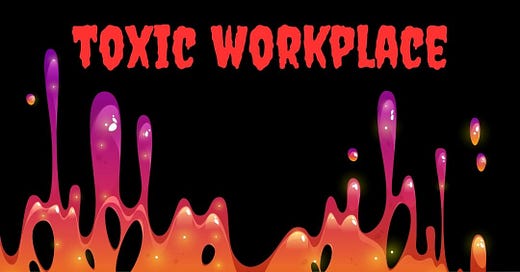How to escape a toxic workplace
What does toxic really mean? And are you now humming Britney Spears?
Halloween is here again, and I love thinking of a theme for a spooky missive.
This year I’m pondering on toxic workplaces, what that means and whether we can escape them.
We’ve all worked in a toxic environment, or worked for toxic people and felt the impact of being in that situation. You might have, like me, stayed longer than you wanted to because it was for your CV or you needed to (money, right?).
It’s interesting as a concept because it’s different for everyone. The definition is fluid, kind of a slime if we’re going with the Halloween vibes.
For me, toxic means somewhere that deeply affects your mental and physical health, somewhere that makes you feel, essentially, like you are being poisoned in some way.
It can be an energy, something about the culture, the management or just one person who is the one who drips that toxicity into the working environment.
I’ve worked in companies where the toxicity comes from above - from leaders who are stuck in their ways or in positions of power without the right training.
It’s strange when that’s the case because those ‘below’ in the hierarchy might be lovely, and a great team to work with but I find it creates a divide. There’s the ‘us vs them’ fight that kicks in. You spend your lunch breaks and after work drinks or zoom meetings or team chats basically slagging off the people who manage you. It’s like it gets into your bones and you can’t shake it off.
Toxicity is an interesting word. Toxic conjures up the idea of something gross. Something that might burn or be caustic. A hazard, a danger, something that might injure or kill even instantly, or slowly and painfully.
Well I’ve worked in places that have felt like I was going through a slow painful process that’s for sure!
Often we stay in toxic workplaces becausewe have to. Money is of course a huge driver in staying somewhere you don’t want to work. It is unlikely, if you’re reading this and want to quit a toxic workplace, that you could do so without any worry of how you’d pay the bills or carry on with life without the money you’re earning.
There’s also the lure of a job being a good step and sticking it out somewhere toxic for the good of your CV.
Quitting or going elsewhere might look ‘bad’ on your record, right?
Quitting a toxic workplace is a process. It’s one you have to navigate while doing your day job. It’s about (sorry, I know I always say this but I believe it) your goals as well. Does the job really feed into your long term plan? Is it really the right step in your journey?
Leaving a job that’s toxic is about stealth. Making sure you’re doing all the right things to get out of there. Being aware of jobs you can apply for, making sure you’re active on LinkedIn and your CV is up to date so you can pounce on those jobs as and when.
Quitting a toxic workplace can take a while but when you have a plan you take back control from a situation that is suffocating you. Make that plan today if you’re stuck somewhere toxic.
What can you begin to do to get out? What needs to happen that you can control to get away from the place
What is the next step, ideally for you?
How do you begin to get there?
Often people are promoted to manager with no training. For example, in the media they go from features writer to senior features writer to features editor and by default they become a manager.
Then they have to lead, often with no experience or training in leadership and often with demands hitting them from above too.
I’m sure it’s the same in other industries - people under pressure to manage when they’ve had no training and have little support. Is it possible for a person to be toxic? I think we all feel we’ve worked with toxic people - the ones who are looking out for themselves to the detriment of the team. The ones who aren’t team players. Is that what a toxic person is?
There have been times I’ve cut and run - applied for jobs and taken the first one offered. I’ve also been able to go freelance when toxicity took over. That’s one good thing about the journalism industry! You can flip to freelance! (Although of course there is still often toxicity - editors making out of hours demands, chasing invoices, being ghosted…)
And so we come to managing the day to day of a toxic workplace, trying to make things less toxic. Looking for an antidote or an anti-venom to the poison you’re being administered.
While you plan your escape you need to cope in the moment. For me, this has included crying at my desk, but also making sure I take regular breaks, putting the Teams Pings on mute, and also conveying feelings to a manager. Having constructive conversations with a team member about a toxic situation to diffuse my own feelings. Avoiding the outside of work discussions that fuel the toxic fire.
Most of all it’s about being true to you. The toxicity will still happen, but it’s how you react that can make the difference to your day-to-day.
Click below to come say hi on Instagram for daily coaching and work insights and dogs!





